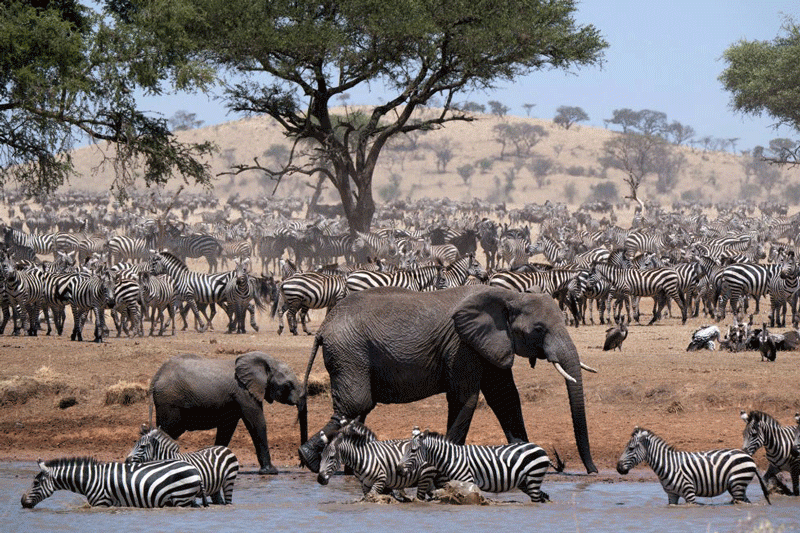
WHEN we think of wildlife films, South Africa and Kenya often come to mind.
This is because these countries are dominant in the media and the internet.
However, we must not overlook Zimbabwe, a country that was once a leading wildlife filming destination in the 1970s and 1980s.
Today, we have an opportunity to encourage wildlife film producers to venture into Zimbabwe's wilderness and capture its natural beauty for the international market.
As of January 2024, there were 5,35 billion internet users worldwide, which was about 66,2% of the global population.
It is time for African filmmakers to produce their own wildlife films and market them to the global community.
The internet continues to revolutionise wildlife filming by expanding the reach, distribution, collaboration and impact of films.
It provides a platform for filmmakers to share their stories, raise awareness, educate and inspire audiences worldwide.
- Cross border thieves target region’s game reserves
- Hwange volunteers fighting to save wild dogs from extinction
- Zim writers win prestigious Windham-Campbell prizes
- Letter to my people: From leading railing firm to borehole drilling
Keep Reading
By so doing, they contribute to the conservation of wildlife and the preservation of natural heritage.
Several renowned wildlife film producers have filmed in Zimbabwe over the years.
These include National Geographic, which has a long history of producing wildlife documentaries.
They have explored the diverse ecosystems, wildlife, and conservation efforts in Zimbabwe's national parks.
The BBC Natural History Unit, which is producing acclaimed wildlife documentaries like Planet Earth, has also filmed in Zimbabwe.
Their productions have showcased the country's stunning landscapes, wildlife behaviour, and conservation challenges.
David Attenborough, the legendary British broadcaster and naturalist has filmed in Zimbabwe during his illustrious career.
Dereck and Beverly Joubert are renowned wildlife filmmakers and conservationists, who have dedicated their lives to documenting Africa's wildlife.
They have filmed in Zimbabwe extensively, capturing the beauty of the country's landscapes and the struggles faced by its wildlife.
These few examples of wildlife film producers, who have recognised the potential of Zimbabwe's wilderness and have captured its beauty on camera.
Their work has not only showcased the country's natural wonders but also contributed to raising awareness about the need for conservation and sustainable practices in the region.
Zimbabwe's wilderness is a hidden gem waiting to be explored and showcased to the world. Its diverse ecosystem, breath-taking landscapes, and abundant wildlife offer a wealth of untapped potential for captivating storytelling.
From the iconic Hwange National Park, where herds of elephants roam, to the majestic Victoria Falls and the enchanting Mana Pools National Park, Zimbabwe presents a rich tapestry of natural wonders that deserve global attention.
By extending an invitation to renowned wildlife film producers, we can unlock the full potential of Zimbabwe's wilderness.
Their expertise and artistic vision can bring fresh perspectives and captivating narratives to the international market.
Capturing Zimbabwe's unique wildlife and landscapes not only educates and inspires audiences but also highlights the need for conservation efforts in the region.
The involvement of international filmmakers can also provide a significant economic boost to local communities, creating employment opportunities and stimulating tourism.
In addition to inviting international filmmakers, it is high time for Africans to seize the opportunity and produce their own wildlife films.
Africa possesses a wealth of talented filmmakers, who can provide authentic perspectives, cultural insights, and stories that resonate with local and global audiences.
By empowering African filmmakers to tell their own narratives, we contribute to a more diverse representation of Africa's wildlife and its conservation challenges.
To support wildlife film production in Zimbabwe and across Africa, it is essential to build a robust infrastructure and foster collaboration.
Governments, conservation organisations, and film industry stakeholders should work together to provide necessary resources, training, and financial incentives.
This collaborative effort can establish a framework for knowledge sharing and skill development, enabling African filmmakers to create high-quality wildlife films that can compete on the international stage.
In addition to encouraging production, it is vital to focus on marketing African wildlife films to the international community.
Africa's rich biodiversity and cultural heritage offer unique selling points that can attract a global audience.
By leveraging various distribution channels, film festivals, and online platforms, African filmmakers can gain visibility, expand their networks, and secure international distribution deals.
This not only benefits the filmmakers themselves but also enhances Africa's representation in the global wildlife film market.
Zimbabwe's wilderness holds immense potential for wildlife film production, and it is time to reclaim its status as a leading destination in the industry.
- Mutisi is the CEO of Hansole Investments(Pvt) Ltd. He is the current chairperson of Zimbabwe Information & Communication Technology, a division of Zimbabwe Institution of Engineers.







